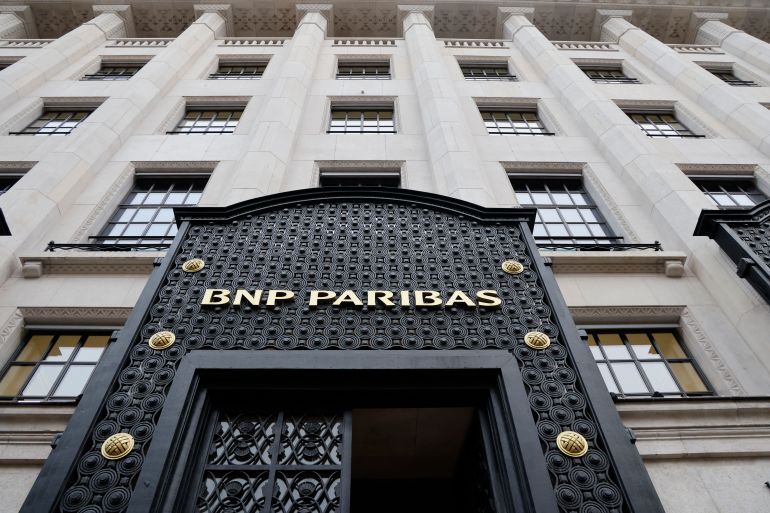US jury finds French bank BNP Paribas complicit in Sudan atrocities
The French bank said in a statement the ruling is ‘clearly wrong’ and that it plans to appeal.

By Lyndal Rowlands and News Agencies
Published On 18 Oct 202518 Oct 2025
Save
A New York jury has found that French banking giant BNP Paribas’s work in Sudan helped to prop up the regime of former ruler Omar al-Bashir, making it liable for atrocities that took place under his rule.
The eight-member jury on Friday sided with three plaintiffs originally from Sudan, awarding a total of $20.75m in damages, after hearing testimony describing horrors committed by Sudanese soldiers and the Popular Defence Forces, the government-linked militia known as the Janjaweed.
Recommended Stories
list of 4 itemsend of list
The plaintiffs – two men and one woman, all now American citizens – told the federal court in Manhattan that they had been tortured, burned with cigarettes, slashed with a knife, and, in the case of the woman, sexually assaulted.
“I have no relatives left,” Entesar Osman Kasher told the court.
The trial focused on whether BNP Paribas’s financial services were a “natural and adequate cause” of the harm suffered by survivors of ethnic cleansing and mass violence in Sudan.
A spokesperson for BNP Paribas said in a statement to the AFP news agency that the ruling “is clearly wrong and there are very strong grounds to appeal the verdict”.
Bobby DiCello, who represented the plaintiffs, called the verdict “a victory for justice and accountability”.
“The jury recognised that financial institutions cannot turn a blind eye to the consequences of their actions,” DiCello said.
“Our clients lost everything to a campaign of destruction fuelled by US dollars, that BNP Paribas facilitated and that should have been stopped,” he said.
Advertisement
BNP Paribas “has supported the ethnic cleansing and ruined the lives of these three survivors”, DiCello said during closing remarks on Thursday.
The French bank, which did business in Sudan from the late 1990s until 2009, provided letters of credit that allowed Sudan to honour import and export commitments.
The plaintiffs argued that these assurances enabled the regime to keep exporting cotton, oil and other commodities, enabling it to receive billions of dollars from buyers that helped finance its operations.
Defence lawyer Dani James argued, “There’s just no connection between the bank’s conduct and what happened to these three plaintiffs.”
The lawyer for BNP Paribas also said the French bank’s operations in Sudan were legal in Europe and that global institutions such as the International Monetary Fund (IMF) partnered with the Sudanese government during the same period.
Defence lawyers also claimed that the bank had no knowledge of human rights violations occurring at that time.
The plaintiffs would have “had their injuries without BNP Paribas”, said lawyer Barry Berke.
“Sudan would and did commit human rights crimes without oil or BNP Paribas,” Berke said.
The verdict followed a five-week jury trial conducted by US District Judge Alvin Hellerstein, who last year denied a request by BNP Paribas to get the case thrown out ahead of trial.
Hellerstein wrote in his decision last year that there were facts showing a relationship between BNP Paribas’s banking services and abuses perpetrated by the Sudanese government.
BNP Paribas had in 2014 agreed to plead guilty and pay an $8.97bn penalty to settle US charges it transferred billions of dollars for Sudanese, Iranian and Cuban entities subject to economic sanctions.
The US government recognised the Sudanese conflict as a genocide in 2004. The war claimed some 300,000 lives between 2002 and 2008 and displaced 2.5 million people, according to the United Nations.
Al-Bashir, who led Sudan for three decades, was ousted and detained in April 2019 following months of protests in Sudan.
He is wanted by the International Criminal Court (ICC) on genocide charges.
In the months that followed al-Bashir’s ousting in 2019, army generals agreed to share power with civilians, but that ended in October 2021, when the leader of the army, Abdel Fattah al-Burhan, and Rapid Support Forces (RSF) commander, Mohamed Hamdan “Hemedti” Dagalo, seized control in a coup.
In April 2023, fighting broke out between the two sides, and forces on both sides have been accused of committing war crimes.

